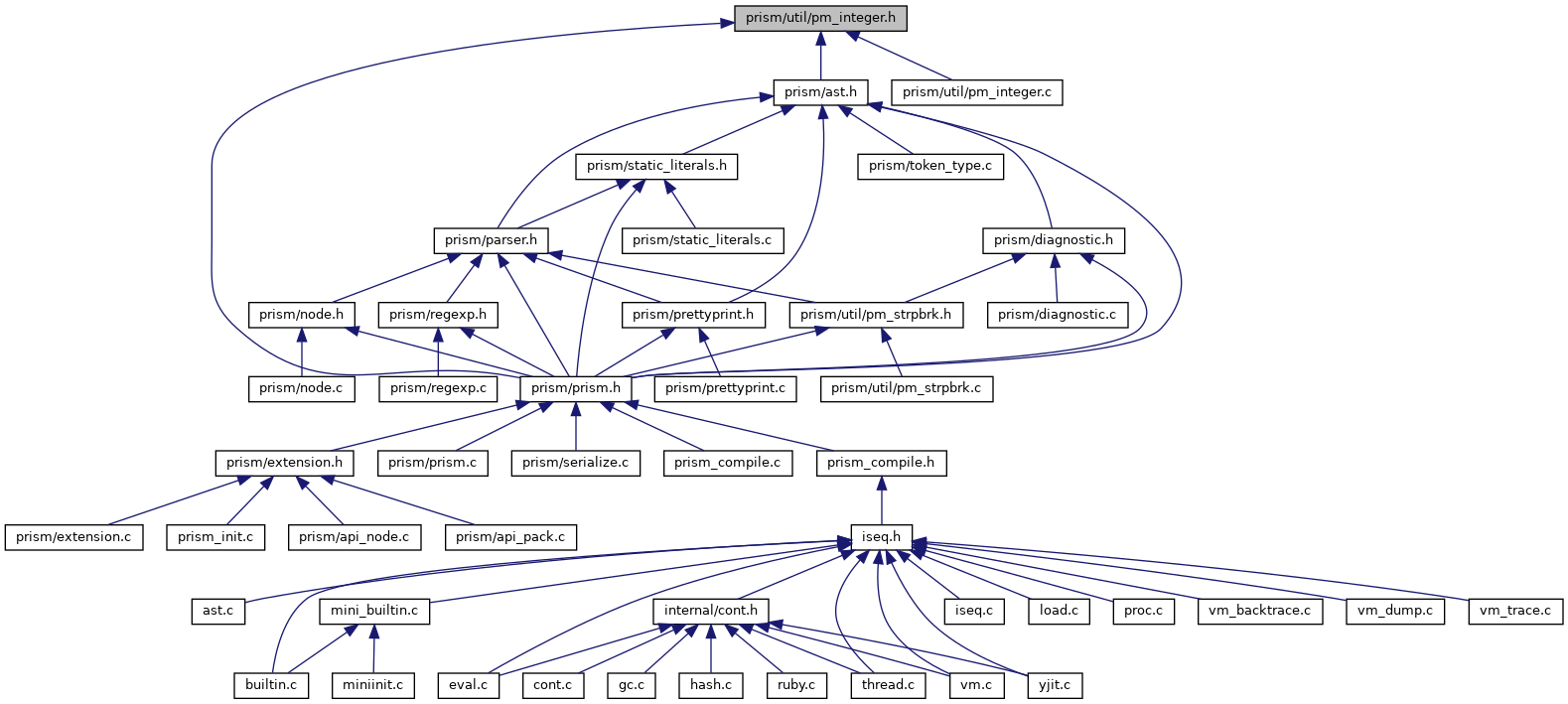(0201e926b05cfb559346c8b6b8bc1d1dbff44aad)
This module provides functions for working with arbitrary-sized integers. More...
#include "prism/defines.h"#include "prism/util/pm_buffer.h"#include <assert.h>#include <stdbool.h>#include <stdint.h>#include <stdlib.h>

Go to the source code of this file.
Data Structures | |
| struct | pm_integer_t |
| A structure represents an arbitrary-sized integer. More... | |
Enumerations | |
| enum | pm_integer_base_t { PM_INTEGER_BASE_DEFAULT , PM_INTEGER_BASE_BINARY , PM_INTEGER_BASE_OCTAL , PM_INTEGER_BASE_DECIMAL , PM_INTEGER_BASE_HEXADECIMAL , PM_INTEGER_BASE_UNKNOWN } |
| An enum controlling the base of an integer. More... | |
Functions | |
| void | pm_integer_parse (pm_integer_t *integer, pm_integer_base_t base, const uint8_t *start, const uint8_t *end) |
| Parse an integer from a string. | |
| int | pm_integer_compare (const pm_integer_t *left, const pm_integer_t *right) |
| Compare two integers. | |
| void | pm_integers_reduce (pm_integer_t *numerator, pm_integer_t *denominator) |
| Reduce a ratio of integers to its simplest form. | |
Detailed Description
This module provides functions for working with arbitrary-sized integers.
Definition in file pm_integer.h.
Enumeration Type Documentation
◆ pm_integer_base_t
| enum pm_integer_base_t |
An enum controlling the base of an integer.
It is expected that the base is already known before parsing the integer, even though it could be derived from the string itself.
Definition at line 50 of file pm_integer.h.
Function Documentation
◆ pm_integer_compare()
| int pm_integer_compare | ( | const pm_integer_t * | left, |
| const pm_integer_t * | right | ||
| ) |
Compare two integers.
This function returns -1 if the left integer is less than the right integer, 0 if they are equal, and 1 if the left integer is greater than the right integer.
- Parameters
-
left The left integer to compare. right The right integer to compare.
- Returns
- The result of the comparison.
This function returns -1 if the left integer is less than the right integer, 0 if they are equal, and 1 if the left integer is greater than the right integer.
Definition at line 546 of file pm_integer.c.
◆ pm_integer_parse()
| void pm_integer_parse | ( | pm_integer_t * | integer, |
| pm_integer_base_t | base, | ||
| const uint8_t * | start, | ||
| const uint8_t * | end | ||
| ) |
Parse an integer from a string.
This assumes that the format of the integer has already been validated, as internal validation checks are not performed here.
- Parameters
-
integer The integer to parse into. base The base of the integer. start The start of the string. end The end of the string.
This assumes that the format of the integer has already been validated, as internal validation checks are not performed here.
Definition at line 476 of file pm_integer.c.
◆ pm_integers_reduce()
| void pm_integers_reduce | ( | pm_integer_t * | numerator, |
| pm_integer_t * | denominator | ||
| ) |
Reduce a ratio of integers to its simplest form.
If either the numerator or denominator do not fit into a 32-bit integer, then this function is a no-op. In the future, we may consider reducing even the larger numbers, but for now we're going to keep it simple.
- Parameters
-
numerator The numerator of the ratio. denominator The denominator of the ratio.
Definition at line 574 of file pm_integer.c.